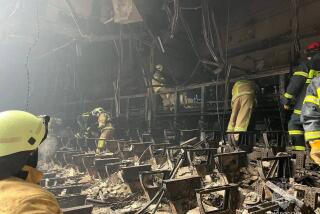Uzbek President Points to Islamic Extremists in Attacks
- Share via
TASHKENT, Uzbekistan — President Islam Karimov blamed Friday’s suicide bombings at the U.S. and Israeli embassies here on the group he accuses of being behind similar attacks earlier this year, pleading in a nationwide TV address Saturday for Uzbeks to spurn extremist Islamic influences.
Karimov spoke after an Uzbek police officer who had been guarding the U.S. Embassy died overnight of injuries from the attack. That raised the death toll to at least six, including the three bombers. The trio of bombings in the Uzbek capital also targeted the prosecutor general’s office.
Karimov did not name a suspect in the attacks, but pointedly mentioned Hizb ut-Tahrir, a secretive extremist Islamic group that has spread across Central Asia since the Soviet collapse. The group, whose name means Party of Liberation, claims to disavow violence in its quest to create worldwide Islamic government.
In a bid to crush extremism, Karimov’s authoritarian regime has arrested thousands of members of Hizb ut-Tahrir and other Muslims who worship outside state-run mosques, but critics say the campaign has backfired and it has drawn strong international criticism.
The near-simultaneous suicide bombings were the second wave of attacks to hit Uzbekistan this year, raising fears of instability in Central Asia’s most populous nation. They took place during the first trial of 15 suspects in the March-April violence that left at least 47 dead.
Karimov said both sets of attacks were organized by “the same group, and serve the same aims,” which he said were to sow fear and disrupt the country’s “peaceful and stable life.”
A source close to Uzbek extremist groups told Associated Press on Saturday that Al Qaeda had directed and financed the group behind Friday’s bombings, which were retaliation for Uzbekistan’s support of the U.S.-declared war on terrorism.
The source, speaking on condition of anonymity, said the group was based in Pakistan and had been founded by several former fighters of the Islamic Movement of Uzbekistan, an Al Qaeda-linked terrorist group, after they fell out with that movement’s leaders.
More to Read
Sign up for Essential California
The most important California stories and recommendations in your inbox every morning.
You may occasionally receive promotional content from the Los Angeles Times.













